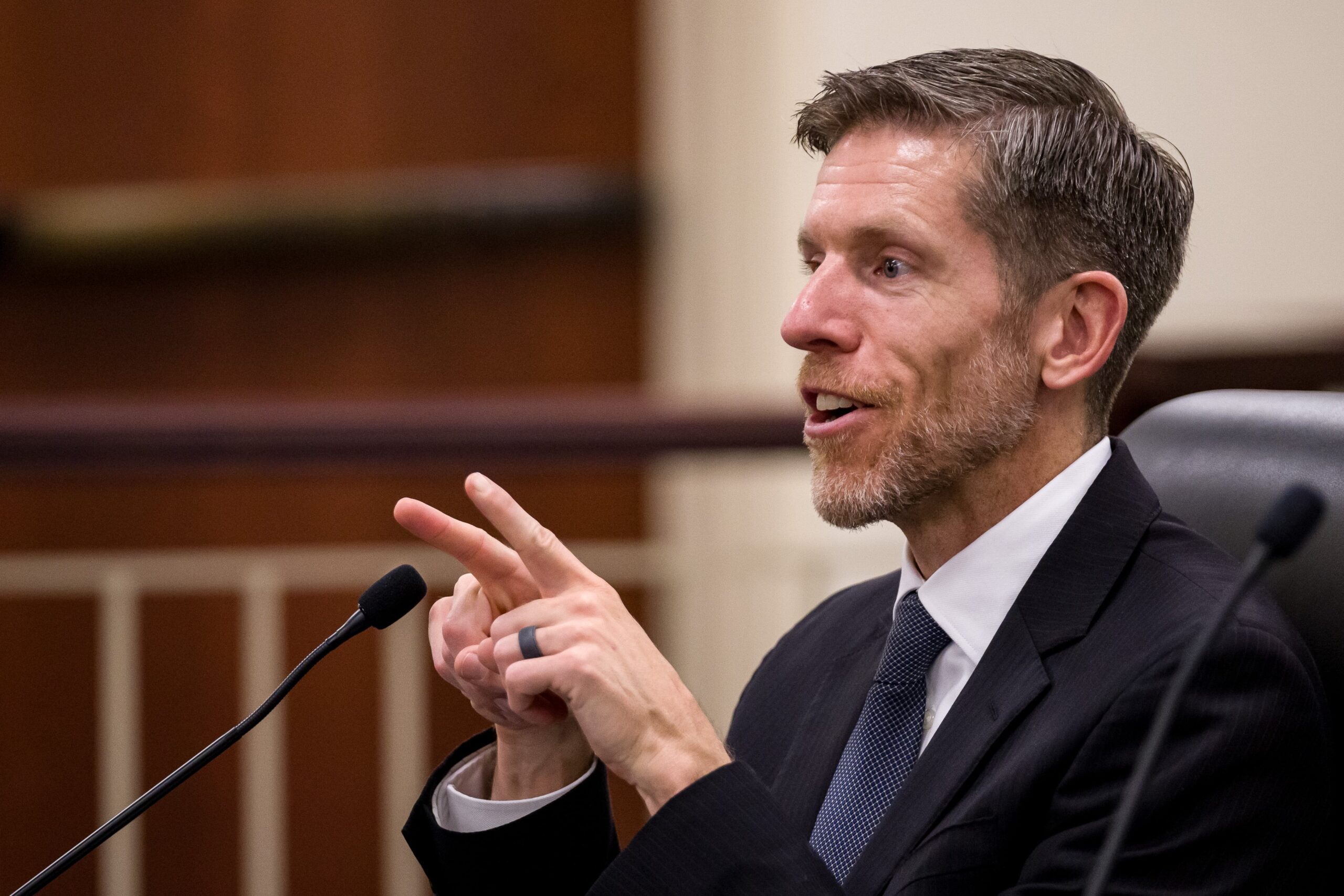Gov. Spencer Cox’s nominee to fill a vacancy on the Utah Supreme Court, Judge John J. Nielsen, declined Thursday to say if he would recuse himself from contentious cases, including an abortion dispute and the state’s redistricting fight, both of which he has been involved in and could still land before the justices.
During the first of two days of confirmation hearings, Sen. Stephanie Pitcher, D-Salt Lake City, pressed Nielsen on the issue. He said he could not commit to taking a specific judicial action but assured that he would “follow the established rules for recusal.”
Before his appointment to the 3rd District bench a year ago, Nielsen was in private practice. He originally worked with former Supreme Court Justice Thomas Lee, brother of Sen. Mike Lee, and later at the firm of Schaerr | Jaffe. During that time, Nielsen filed two Supreme Court briefs supporting the state’s near-complete abortion ban and advocating for a constitutional amendment that would have allowed the Legislature to repeal citizen-passed ballot initiatives.
Nielsen told the committee that in the year he has served on the court, he has had time to set aside prior advocacy. He explained it is not uncommon for attorneys who have been prosecutors or defense lawyers to later decide cases that deal with issues they previously advocated for or against.
“Any lawyer who has ever had any case knows that you are a means to someone else’s end, and that you are making arguments on behalf of clients and not the other way around,” Nielsen said.
One notable case, State v. Planned Parenthood, involved Lee and Nielsen filing an amicus brief — often referred to as a friend-of-the-court brief — on behalf of Pro-Life Utah. The brief challenged a lower court decision blocking a state law that would have outlawed almost all abortions in Utah. It presented an “originalist” argument, key to Nielsen’s judicial philosophy, drawing on newspaper articles from the 1850s to 1940s to argue that when the Utah Constitution was ratified, Utahns did not view it as protecting a right to abortion.
“At the time of ratification, the general public did not view abortion as a protected constitutional right,” the brief states. “Quite the opposite. It viewed it as something meriting the utmost condemnation available in our law and society: criminal charge and punishment.”
However, the justices were unconvinced and ruled that the lower court judge did not abuse their discretion in blocking the abortion ban from taking effect while ongoing litigation continues. The lawsuit remains active, and the law is still enjoined.
Nielsen also filed a second brief in the ongoing litigation over the Better Boundaries initiative, a 2018 voter-approved ballot measure that sought to create an independent redistricting commission and ban partisan gerrymandering. The Legislature largely repealed the measure, which the Supreme Court found violated citizens’ constitutional right to make law through the initiative process.
In response, the Legislature proposed a constitutional amendment to explicitly allow the Legislature to repeal ballot initiatives. The court blocked the amendment after ruling that the ballot description was deceptive and that the Legislature failed to meet the constitutional requirement to publish the amendment language statewide in newspapers.
Nielsen authored an amicus brief arguing that the Supreme Court’s decision was wrong and had deprived voters of the right to decide the issue themselves. This brief was filed on behalf of 10 voters who wanted the amendment to proceed. Nielsen also indicated that the Utah Republican Party was a client in that matter, though the party was not listed as a party on the brief. The Utah GOP holds supermajorities in both the state Senate and House.
Beyond these issues, Nielsen has represented the state in defending a law banning transgender girls from competing in girls’ high school sports. He also represented a group of downtown business owners who sued Salt Lake City, alleging the city was responsible for damage to their property due to its failure to address homelessness.
Sen. Todd Weiler, chair of the confirmation committee, compared Nielsen’s situation to former U.S. Supreme Court Justice Thurgood Marshall, who, before joining the court, made his name as a civil rights attorney arguing landmark cases such as Brown v. Board of Education.
“Should the Senate not have confirmed him because of his prior clients?” Weiler asked.
“It’s a perfect example,” Nielsen replied. “When somebody is a civil rights attorney and they’ve done that work, it doesn’t mean that they can’t be a judge on civil rights cases. In fact, that’s where they can contribute a lot of perspective, having litigated in that area, and that certainly wasn’t a reason to keep them off the U.S. Supreme Court. In fact, that’s what a lot of his legacy is tied to.”
https://www.sltrib.com/news/politics/2025/10/31/utah-supreme-court-nominee-john-j/

